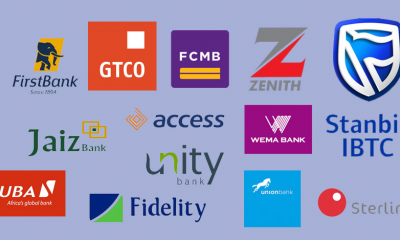Economy
Drop in Nigerian Treasury Bills Yield Imminent

By FSDH Research
Yields on the Nigerian Treasury Bills (NTBs), particularly on the 364-day tenor, are likely to drop with the plan of the Debt Management Office (DMO) to refinance the NTBs through foreign debt.
The DMO hinted recently that the Federal Government of Nigeria (FGN) plans to issue about US$3bn in foreign debt of longer tenor, to refinance the domestic debt particularly the high-cost NTBs.
The plan is in line with the debt management strategy of the FGN for 2016-2019, with the overall objective of reducing its total cost of borrowing to achieve the country’s strategic target of an optimal debt mix of 60 percent and 40 percent for domestic and external debts respectively.
The debt management strategy also sets a target of domestic debt mix of 75 percent and 25 percent for long and short-tenored debts respectively.
Our analysis of the data from the DMO on the debt structure of Nigeria as at March 2017 shows that the total public debt stood at N19.16 trillion, made up of N14.93 trillion (78 percent) and N4.23 trillion (22 percent) in domestic and foreign debts respectively.
Although the external debt component at 22 percent as at March 2017 is far from the optimal mix of 40 percent, it is an improvement from 14 percent as at 2013.
If the DMO were to move the debt position as at March 2017 to the planned optimal level, it means that it would have to refinance about N3.43 trillion of the local debt in favour of the external debt.
Thus, we expect the external borrowing to grow faster than the domestic borrowing in the medium to long term.
The FGN’s component of the domestic debt stood at N11.97 trillion as at March 2017. NTB, which is the short-term debt, accounted for 30 percent or N3.60 trillion of the domestic debt of the FGN. This is higher than the target of 25 percent under the debt management strategy, meaning that the FGN could be issuing more of FGN Bonds than NTBs going forward.
This strategy will achieve two things: reduce the weighted average cost of borrowing for the government because the interest rate on the 364-Day NTB is higher than the interest rate on the FGN Bonds; and extend the tenor of the FGN debts.
Many corporate and individual borrowers have criticized the crowding out effect of the NTBs due to their high yields. The average yield on the 364-Day NTB in 2016 stood at 16.15 percent while the average yield between January 2017 and August 2017 stood at 22.91 percent.
From the monetary policy perspective, the high yields may be necessary to tame high inflation and protect the value of the local currency – it however constitutes a drain on the inadequate revenue of the FGN.
The International Monetary Fund (IMF) noted earlier in August 2017 that preliminary data for the first half of 2017 indicates significant revenue shortfalls, with the interest-payments to revenue ratio remaining high, at 40 percent as at the end of June 2017, and projected to increase further under current policies.
The DMO in its 2016 Debt Sustainability Analysis (DSA) report notes that the debt service-to-revenue ratio (for FGN only) breached the country’s specific threshold of 28 percent. The DSA report added that the FGN debt portfolio still remains highly vulnerable to persistent shocks in revenue, indicating a potential challenge in maintaining debt sustainability.
The total amount of debt service in 2016 stood at N1.20trn and represents 58 percent of the federal allocation disbursed to the FGN.
As at March 2017 the total debt service stood at N449 billion representing 82 percent of the total FGN allocation of N549 billion for the period.
We note that FGN revenue has been challenged in the last two years on account of a drop in oil revenue.
Thus, the plan of the FGN is to use the refinancing to lower debt service figures taking advantage of the relatively lower interest rate in the international financial markets. The FGN will have to put in place strategies to manage the currency risks associated with foreign borrowing.
The average yield on the FGN 6.375 percent July 2023 Eurobond from January till August 21, 2017 is 5.94 percent compared with 364-Day NTB of 22.91 percent.
The various efforts of the government should also increase revenue accruable to the country and the FGN.
Economy
NGX Market Cap Surpasses N110trn as FY 2025 Earnings Impress Investors

By Dipo Olowookere
Investors at the Nigerian Exchange (NGX) Limited have continued to show excitement for the full-year earnings of companies on the exchange so far.
On Friday, Customs Street further appreciated by 1.01 per cent as more organization released their financial statements for the 2025 fiscal year.
During the session, traders continued their selective trading strategy, with the energy sector going up by 2.47 per cent at the close of business despite profit-taking in the banking counter, which saw its index down by 0.11 per cent.
Yesterday, the insurance space grew by 2.16 per cent, the industrial goods segment expanded by 1.70 per cent, and the consumer goods industry jumped by 0.42 per cent.
Consequently, the All-Share Index (ASI) increased by 1,722.13 points to 171,727.49 points from 170,005.36 points, and the market capitalisation soared by N1.106 trillion to N110.235 trillion from the N109.129 trillion it ended on Thursday.
Business Post reports that there were 59 appreciating stocks and 19 depreciating stocks on Friday, representing a positive market breadth index and strong investor sentiment.
The trio of Omatek, Deap Capital, and NAHCO gained 10.00 per cent each to sell for N2.64, N6.82, and N136.40 apiece, as Zichis and Austin Laz appreciated by 9.98 per cent each to close at N6.72 and N5.40, respectively.
Conversely, The Initiates depreciated by 9.74 per cent to N19.45, DAAR Communications slumped by 7.32 per cent to N1.90, United Capital crashed by 6.55 per cent to N18.55, Coronation Insurance lost 5.71 per cent to quote at N3.30, and First Holdco shrank by 5.53 per cent to N47.00.
The activity chart showed an improvement in the activity level, with the trading volume, value, and number of deals up by 33.77 per cent, 93.27 per cent, and 10.63 per cent, respectively.
This was because traders transacted 953.8 million shares worth N43.1 billion in 51,005 deals compared with the 713.0 million shares valued at N22.3 billion traded in 46,104 deals a day earlier.
Fidelity Bank was the most active with 92.4 million units sold for N1.8 billion, Chams transacted 69.2 million units valued at N310.9 million, Deap Capital exchanged 59.1 million units worth N382.7 million, Access Holdings traded 57.2 million units valued at N1.3 billion, and Tantalizers transacted 48.6 million units worth N228.2 million.
Economy
Naira Retreats to N1,366.19/$1 After 13 Kobo Loss at Official Market

By Adedapo Adesanya
The value of the Naira contracted against the United States Dollar on Friday by 13 Kobo or 0.01 per cent to N1,366.19/$1 in the Nigerian Autonomous Foreign Exchange Market (NAFEX) from the previous day’s value of N1,366.06/$1.
According to data from the Central Bank of Nigeria (CBN), the Nigerian currency also depreciated against the Pound Sterling in the same market window yesterday by N2.37 to N1,857.75/£1 from the N1,855.38/£1 it was traded on Thursday, and further depleted against the Euro by 57 Kobo to close at N1,612.52/€1 versus the preceding session’s N1,611.95/€1.
In the same vein, the exchange rate for international transactions on the GTBank Naira card showed that the Naira lost N8 on the greenback yesterday to N1,383/$1 from the previous day’s N1,375/$1 and at the black market, the Nigerian currency maintained stability against the Dollar at N1,450/$1.
FX analysts anticipate this trend to persist, primarily influenced by increasing external reserves, renewed inflows of foreign portfolio investments, and a reduction in speculative demand.
In the short term, stability in the FX market is expected to continue, supported by policy interventions and improving market confidence.
Nigeria’s foreign reserves experienced an upward trajectory, increasing by $632.38 million within the week to $46.91 billion from $46.27 billion in the previous week.
The Dollar appreciation this week appears to be largely technical, serving as a correction to the substantial losses experienced from mid- to late January.
Meanwhile, the cryptocurrency market slightly appreciated, with Bitcoin (BTC) climbing near $68,000, up nearly 5 per cent since hitting $60,000 late on Thursday after investor confidence in crypto’s utility as a store of value, inflation hedge, and digital currency faltered.
The sell-off extended beyond crypto, with silver plunging 15 per cent and gold sliding more than 2 per cent. US stocks also fell.
The latest recoup saw the price of BTC up by 4.7 per cent to $67,978.96, as Ethereum (ETH) appreciated by 6.3 per cent to $2,021.10, and Ripple (XRP) surged by 9.5 per cent to $1.42.
In addition, Solana (SOL) grew by 7.3 per cent to $85.22, Cardano (ADA) added 6.1 per cent to trade at $0.2683, Dogecoin (DOGE) expanded by 5.4 per cent to $0.0958, Litecoin (LTC) rose by 5.2 per cent to $53.50, and Binance Coin (BNB) jumped by 2.3 per cent to $637.79, while the US Dollar Tether (USDT) and the US Dollar Coin (USDC) traded flat at $1.00 each.
Economy
Oil Prices Climb on Worries of Possible Iran-US Conflict

By Adedapo Adesanya
Oil prices settled higher on Friday as traders worried that this week’s talks between the US and Iran had failed to reduce the risk of a military conflict between the two countries.
Brent crude futures traded at $68.05 a barrel after going up by 50 cents or 0.74 per cent, and the US West Texas Intermediate (WTI) crude futures finished at $63.55 a barrel due to the addition of 26 cents or 0.41 per cent.
Iran and the US held negotiations in Muscat, the capital of Oman, on Friday to overcome sharp differences over Iran’s nuclear programme.
It was reported that the talks had ended with Iran’s foreign minister saying negotiators will return to their capitals for consultations and the talks will continue.
Regardless, the meeting kept investors anxious about geopolitical risk, as Iran wanted to stick to nuclear issues while the US wanted to discuss Iran’s ballistic missiles and support for armed groups in the region.
Any escalation of tension between the two nations could disrupt oil flows, since about a fifth of the world’s total consumption passes through the Strait of Hormuz between Oman and Iran.
Saudi Arabia, the United Arab Emirates, Kuwait and Iraq export most of their crude via the strait, as does Iran, which is a member of the Organisation of the Petroleum Exporting Countries (OPEC).
According to Reuters, Iran objected to the presence of any US Central Command (CENTCOM) or other regional military officials, saying that would jeopardise the process.
The current confrontation was sparked by more than two weeks of unrest in Iran that saw authorities launch a deadly crackdown that killed thousands of civilians and shocked the world. As reports of the deaths trickled out of Iran, US President Donald Trump threatened to strike Iran if any of the tens of thousands of protesters arrested were executed.
Meanwhile, Kazakhstan’s planned oil exports could fall by as much as 35 per cent this month via its main route through Russia, as the country’s top oil company, Tengiz oilfield, slowly recovers from fires at power facilities in January.
ING analysts have pointed out Iran’s neighbour, Iraq, and a disagreement with the US as another bullish factor for oil prices. It seems Iraqi politicians favour Mr Nouri al-Maliki as the country’s next Prime Minister, but the US thinks Mr al-Maliki is too close to Iran. President Trump has already threatened the oil producer with consequences if he emerges as PM.
-

 Feature/OPED6 years ago
Feature/OPED6 years agoDavos was Different this year
-
Travel/Tourism9 years ago
Lagos Seals Western Lodge Hotel In Ikorodu
-

 Showbiz3 years ago
Showbiz3 years agoEstranged Lover Releases Videos of Empress Njamah Bathing
-

 Banking8 years ago
Banking8 years agoSort Codes of GTBank Branches in Nigeria
-

 Economy3 years ago
Economy3 years agoSubsidy Removal: CNG at N130 Per Litre Cheaper Than Petrol—IPMAN
-

 Banking3 years ago
Banking3 years agoSort Codes of UBA Branches in Nigeria
-

 Banking3 years ago
Banking3 years agoFirst Bank Announces Planned Downtime
-

 Sports3 years ago
Sports3 years agoHighest Paid Nigerian Footballer – How Much Do Nigerian Footballers Earn

















